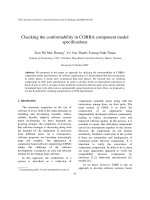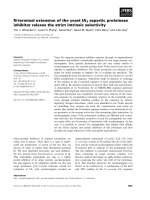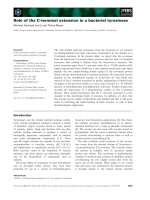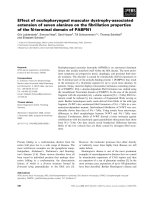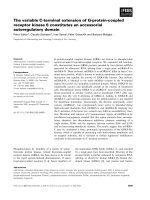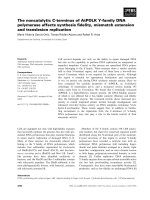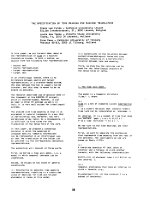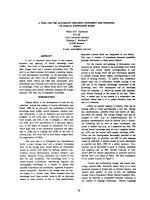THE OPENCL™ EXTENSION SPECIFICATION
Bạn đang xem bản rút gọn của tài liệu. Xem và tải ngay bản đầy đủ của tài liệu tại đây (104.83 KB, 15 trang )
<span class="text_page_counter">Trang 1</span><div class="page_container" data-page="1">
The OpenCL <sup>™</sup> Extension Specification
Version v3.0.16, Thu, 04 Apr 2024 12:00:0 +0000: from git branch: main commit: 16880f9276828e66bb97017f10f34f97423d1bcf
</div><span class="text_page_counter">Trang 2</span><div class="page_container" data-page="2"><b>Table of Contents</b>
1. Extensions Overview. . . <small> </small>2
1.1. Naming Convention for Optional Extensions . . . <small> </small>2
1.2. Compiler Directives for Optional Extensions. . . <small> </small>3
1.3. Getting OpenCL API Extension Function Pointers . . . <small> </small>4
Index . . . <small> </small>6
Appendix A: Extensions Promoted to Core Features. . . <small> </small>7
A.1. For OpenCL 1.1:. . . <small> </small>7
A.2. For OpenCL 1.2:. . . <small> </small>7
A.3. For OpenCL 2.0:. . . <small> </small>7
A.4. For OpenCL 2.1:. . . <small> </small>7
A.5. For OpenCL 3.0:. . . <small> </small>7
Appendix B: Deprecated Extensions . . . <small> </small>8
B.1. For OpenCL 1.1:. . . <small> </small>8
Appendix C: Quick Reference . . . <small> </small>9
</div><span class="text_page_counter">Trang 3</span><div class="page_container" data-page="3">Copyright 2008-2024 The Khronos Group Inc.
This Specification is protected by copyright laws and contains material proprietary to Khronos. Except as described by these terms, it or any components may not be reproduced, republished, distributed, transmitted, displayed, broadcast or otherwise exploited in any manner without the express prior written permission of Khronos.
This Specification has been created under the Khronos Intellectual Property Rights Policy, which is Attachment A of the Khronos Group Membership Agreement available at www.khronos.org/files/member_agreement.pdf and defines the terms 'Scope', 'Compliant Portion', and 'Necessary Patent Claims'.
Khronos grants a conditional copyright license to use and reproduce the unmodified Specification for any purpose, without fee or royalty, EXCEPT no licenses to any patent, trademark or other intellectual property rights are granted under these terms. Parties desiring to implement the Specification and make use of Khronos trademarks in relation to that implementation, and receive reciprocal patent license protection under the Khronos Intellectual Property Rights Policy must become Adopters and confirm the implementation as conformant under the process defined by Khronos for this Specification; see makes no, and expressly disclaims any, representations or warranties, express or implied, regarding this Specification, including, without limitation: merchantability, fitness for a particular purpose, non-infringement of any intellectual property, correctness, accuracy, completeness, timeliness, and reliability. Under no circumstances will Khronos, or any of its Promoters, Contributors or Members, or their respective partners, officers, directors, employees, agents or representatives be liable for any damages, whether direct, indirect, special or consequential damages for lost revenues, lost profits, or otherwise, arising from or in connection with these materials.
Where this Specification identifies specific sections of external references, only those specifically identified sections define normative functionality. The Khronos Intellectual Property Rights Policy excludes external references to materials and associated enabling technology not created by Khronos from the Scope of this specification, and any licenses that may be required to implement such referenced materials and associated technologies must be obtained separately and may involve royalty payments.
Khronos® and Vulkan® are registered trademarks, and SPIR™, SPIR-V™, and SYCL™ are trademarks of The Khronos Group Inc. OpenCL™ is a trademark of Apple Inc. used under license by Khronos. OpenGL® is a registered trademark and the OpenGL ES™ and OpenGL SC™ logos are trademarks of Hewlett Packard Enterprise used under license by Khronos. All other product names, trademarks, and/or company names are used solely for identification and belong to their respective owners.
</div><span class="text_page_counter">Trang 4</span><div class="page_container" data-page="4"><b>Chapter 1. Extensions Overview</b>
<i>Extensions are optional features which may be supported by OpenCL implementations. Extensions</i>
are not required to be supported by a conformant OpenCL implementation, but are expected to be widely available, and in some cases may define functionality that is likely to be required in a future revision of the OpenCL specification.
In the past, this document contained full specification language for Khronos-approved khr extensions, described in terms of changes to the core OpenCL Specification. This extension language has now been integrated into the OpenCL 3.0 Specification, and can be read in context there.
<i>The remaining parts of this document describe general issues in using extensions, such as API</i>
Naming Conventions for Optional Extensions; OpenCL C Compiler Directives for Optional Extensions; and Getting OpenCL API Extension Function Pointers.
In addition, there is a section on Extensions to the OpenCL SPIR-V Environment.
Finally, the Quick Reference appendix summarizes khr extensions and links to them in the OpenCL API Specification. In some cases, extensions are mostly or entirely to the OpenCL C language rather than to the OpenCL API. Such extensions can be reached by following the links in the API Specification extension appendices.
<b>1.1. Naming Convention for Optional Extensions</b>
OpenCL extensions approved by the OpenCL working group use the following naming convention:
<i>• A unique name string of the form <b>"cl_khr_<name>"</b></i> is associated with each extension. If the extension is supported by an implementation, this string will be present in the implementation’s CL_PLATFORM_EXTENSIONS string or CL_DEVICE_EXTENSIONS string.
<i><b>• All API functions defined by the extension will have names of the form cl<function_name</b></i>
<i><b>• All enumerants defined by the extension will have names of the form CL_<enum_name>_KHR.</b></i>
Functions and enumerants defined by extensions that are promoted to core features will have their
<b>KHR affix removed. OpenCL implementations of such later revisions must also export the name</b>
strings of promoted extensions in the CL_PLATFORM_EXTENSIONS or CL_DEVICE_EXTENSIONS string, and
<b>support the KHR-affixed versions of functions and enumerants as a transition aid.</b>
Vendor extensions are strongly encouraged to follow a similar naming convention:
<i>• A unique name string of the form <b>"cl_<vendor_name>_<name>"</b></i> is associated with each extension. If the extension is supported by an implementation, this string will be present in the implementation’s CL_PLATFORM_EXTENSIONS string or CL_DEVICE_EXTENSIONS string.
• All API functions defined by the vendor extension will have names of the form
<b>• All enumerants defined by the vendor extension will have names of the form CL_<</b>
</div><span class="text_page_counter">Trang 5</span><div class="page_container" data-page="5"><b>1.2. Compiler Directives for Optional Extensions</b>
<b>The #pragma OPENCL EXTENSION directive controls the behavior of the OpenCL compiler withrespect to extensions. The #pragma OPENCL EXTENSION directive is defined as:</b>
<b>#pragma OPENCL EXTENSION <extension_name> : <behavior>#pragma OPENCL EXTENSION all : <behavior></b>
<i>where extension_name is the name of the extension. The extension_name will have names of the</i>
<i><b>form cl_khr_<name> for an extension approved by the OpenCL working group and will havenames of the form cl_<vendor_name>_<name> for vendor extensions. The token all means that</b></i>
<i>the behavior applies to all extensions supported by the compiler. The behavior can be set to one of</i>
the following values given by the table below.
<b>enable</b> <i>Behave as specified by the extension extension_name.</i>
Report an error on the <b>#pragma OPENCL EXTENSION</b><i> if the extension_name is</i>
<b>not supported, or if all is specified.</b>
<b>disable</b> Behave (including issuing errors and warnings) as if the extension
<i>extension_name is not part of the language definition.</i>
<b>If all is specified, then behavior must revert back to that of the </b>
non-extended core version of the language being compiled to.
Warn on the <b>#pragma OPENCL EXTENSION</b><i> if the extension extension_name is</i>
not supported.
The <b>#pragma OPENCL EXTENSION</b> directive is a simple, low-level mechanism to set the behavior for each extension. It does not define policies such as which combinations are appropriate; those must be defined elsewhere. The order of directives matter in setting the behavior for each extension.
<b>Directives that occur later override those seen earlier. The all variant sets the behavior for all</b>
<i>extensions, overriding all previously issued extension directives, but only if the behavior is set to</i>
The initial state of the compiler is as if the directive
<b>#pragma OPENCL EXTENSION all : disable</b>
was issued, telling the compiler that all error and warning reporting must be done according to this specification, ignoring any extensions.
Every extension which affects the OpenCL language semantics, syntax or adds built-in functions to
</div><span class="text_page_counter">Trang 6</span><div class="page_container" data-page="6">the language must create a preprocessor #define that matches the extension name string. This #define would be available in the language if and only if the extension is supported on a given implementation.
An extension which adds the extension string "cl_khr_3d_image_writes" should also add a preprocessor #define<b> called cl_khr_3d_image_writes. A kernel can now use this preprocessor</b>
#define to do something like:
<b>void*</b> clGetExtensionFunctionAddressForPlatform(<b>cl_platform_id</b> platform, <b>constchar</b> funcname)
<i>returns the address of the extension function named by funcname for a given platform The pointer</i>
returned should be cast to a function pointer type matching the extension function’s definition defined in the appropriate extension specification and header file. A return value of NULL indicates
<i>that the specified function does not exist for the implementation or platform is not a valid platform.</i>
A non-NULL<b> return value for clGetExtensionFunctionAddressForPlatform does not guarantee that</b>
an extension function is actually supported by the platform. The application must also make a
<b>corresponding query using clGetPlatformInfo(platform, CL_PLATFORM_EXTENSIONS, …) or</b>
<b>clGetDeviceInfo(device, CL_DEVICE_EXTENSIONS, …) to determine if an extension is supported by</b>
the OpenCL implementation.
Since there is no way to qualify the query with a device, the function pointer returned must work for all implementations of that extension on different devices for a platform. The behavior of calling a device extension function on a device not supporting that extension is undefined.
<b>clGetExtensionFunctionAddressForPlatform may not be be used to query for core </b>
(non-extension) functions in OpenCL. For extension functions that may be queried using
<b>clGetExtensionFunctionAddressForPlatform, implementations may also choose to export those</b>
functions statically from the object libraries implementing those functions, however, portable applications cannot rely on this behavior.
Function pointer typedefs must be declared for all extensions that add API entrypoints. These typedefs are a required part of the extension interface, to be provided in an appropriate header (such as cl_ext.h if the extension is an OpenCL extension, or cl_gl_ext.h if the extension is an OpenCL / OpenGL sharing extension).
</div><span class="text_page_counter">Trang 7</span><div class="page_container" data-page="7">The following convention must be followed for all extensions affecting the host API:
<b>#ifndef extension_name#define extension_name 1</b>
<i>// all data typedefs, token #defines, prototypes, and// function pointer typedefs for this extension// function pointer typedefs must use the// following naming convention</i>
(CL_API_CALL <b>*</b>clExtensionFunctionNameTAG_fn)(...);
<b>#endif // _extension_name_</b>
where TAG can be KHR, EXT or vendor-specific.
Consider, for example, the cl_khr_gl_sharing extension. This extension would add the following to cl_gl_ext.h:
<b>#ifndef cl_khr_gl_sharing#define cl_khr_gl_sharing 1</b>
<i>// all data typedefs, token #defines, prototypes, and// function pointer typedefs for this extension</i>
<i>// function pointer typedefs must use the// following naming convention</i>
</div><span class="text_page_counter">Trang 8</span><div class="page_container" data-page="8">clGetExtensionFunctionAddressForPlatform, 4
</div><span class="text_page_counter">Trang 9</span><div class="page_container" data-page="9"><b>Appendix A: Extensions Promoted to CoreFeatures</b>
<b>A.1. For OpenCL 1.1:</b>
• The functionality previously described by cl_khr_byte_addressable_store is now part of the core feature set.
• The functionality previously described by cl_khr_global_int32_base_atomics, cl_khr_global_ int32_extended_atomics, cl_khr_local_int32_base_atomics, and cl_khr_local_int32_extended_ atomics is now part of the core feature set.
<b>A.2. For OpenCL 1.2:</b>
• The functionality previously described by cl_khr_fp64 is now an optional core feature.
<b>A.3. For OpenCL 2.0:</b>
• The functionality described by cl_khr_3d_image_writes is part of the core feature set. • The functionality described by cl_khr_create_command_queue is part of the core feature set. • The functionality described by cl_khr_depth_images is now part of the core feature set.
• The functionality described by cl_khr_image2d_from_buffer is now part of the core feature set.
<b>A.4. For OpenCL 2.1:</b>
• The functionality described by cl_khr_il_program is now part of the core feature set.
• The API functionality described by cl_khr_subgroups is now part of the core API feature set, but the built-in functions described by cl_khr_subgroups must still be accessed as an extension to the OpenCL 2.0 C Language specification.
<b>A.5. For OpenCL 3.0:</b>
• The API functionality described by cl_khr_extended_versioning is now part of the core API feature set, with minor modifications.
• The built-in functions described by cl_khr_subgroups are now supported in OpenCL C 3.0 when the {opencl_c_subgroups} feature is supported.
</div><span class="text_page_counter">Trang 10</span><div class="page_container" data-page="10"><b>Appendix B: Deprecated ExtensionsB.1. For OpenCL 1.1:</b>
• The cl_khr_select_fprounding_mode extension has been deprecated. Its use is no longer recommended.
</div><span class="text_page_counter">Trang 11</span><div class="page_container" data-page="11"><b>Appendix C: Quick Reference</b>
Each extension in this table includes a link to the corresponding appendix in the OpenCL 3.0 API Specification, which provides a fuller description and references to the actual extension specification language in the API and C Language Specifications.
<b>Extension Name and LinkBrief DescriptionStatus</b>
cl_khr_3d_image_writes Write to 3D images Core Feature in OpenCL 2.0 cl_khr_async_work_group_copy_fence Asynchronous Copy Fences Extension cl_khr_byte_addressable_store Read and write from 8-bit and cl_khr_command_buffer_multi_device Allow a command-buffer to
contain commands targeting different devices
Provisional Extension cl_khr_command_buffer_mutable_dispatch Modify kernel execution
commands between enqueues of a cl_khr_d3d10_sharing Share Direct3D 10 Buffers and
Textures with OpenCL
Extension cl_khr_d3d11_sharing Share Direct3D 11 Buffers and
Textures with OpenCL cl_khr_egl_image Share EGL Images with OpenCL Extension cl_khr_extended_async_copies 2D and 3D Async Copies Extension cl_khr_extended_bit_ops Bit Insert, Extract, and Reverse
Extension
</div><span class="text_page_counter">Trang 12</span><div class="page_container" data-page="12"><b>Extension Name and LinkBrief DescriptionStatus</b>
cl_khr_extended_versioning Extend versioning of platform, devices, extensions, etc.
Core Feature in OpenCL 3.0 (with minor changes) cl_khr_external_memory Common Functionality for
External Memory Sharing cl_khr_expect_assume Kernel Optimization Hints Extension cl_khr_external_semaphore Common Functionality for
External Semaphore Sharing cl_khr_gl_sharing Sharing OpenGL Buffers and
Textures with OpenCL
Extension
</div><span class="text_page_counter">Trang 13</span><div class="page_container" data-page="13"><b>Extension Name and LinkBrief DescriptionStatus</b>
cl_khr_global_int32_base_atomics Basic Atomic Operations on 32-bit Integers in Global Memory
Core Feature in OpenCL 1.1 cl_khr_global_int32_extended_atomics Extended Atomic Operations on
32-bit Integers in Global Memory
Core Feature in OpenCL 1.1
cl_khr_il_program Support for Intermediate
Language (IL) Programs (SPIR-V) cl_khr_int64_base_atomics Basic Atomic Operations on 64-bit
Integers in Global and Local Memory
cl_khr_int64_extended_atomics Extended Atomic Operations on 64-bit Integers in Global and Local Memory
cl_khr_local_int32_base_atomics Basic Atomic Operations on 32-bit Integers in Local Memory
Core Feature in OpenCL 1.1 cl_khr_local_int32_extended_atomics Extended Atomic Operations on
32-bit Integers in Local Memory
Core Feature in OpenCL 1.1 cl_khr_integer_dot_product Integer dot product operations Extension cl_khr_kernel_clock Sample Clock Values Within a
</div>